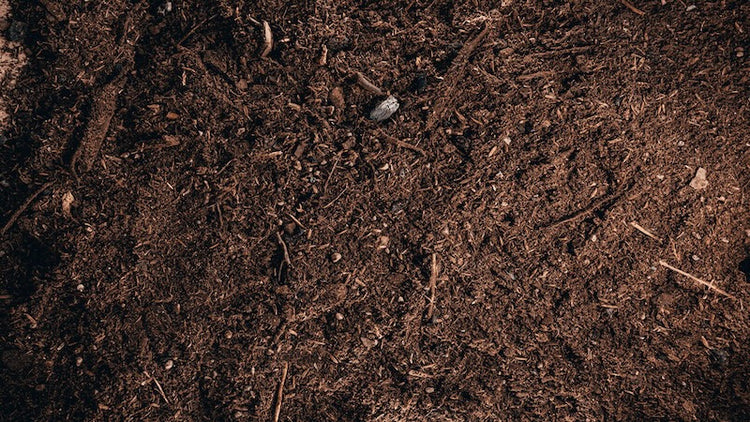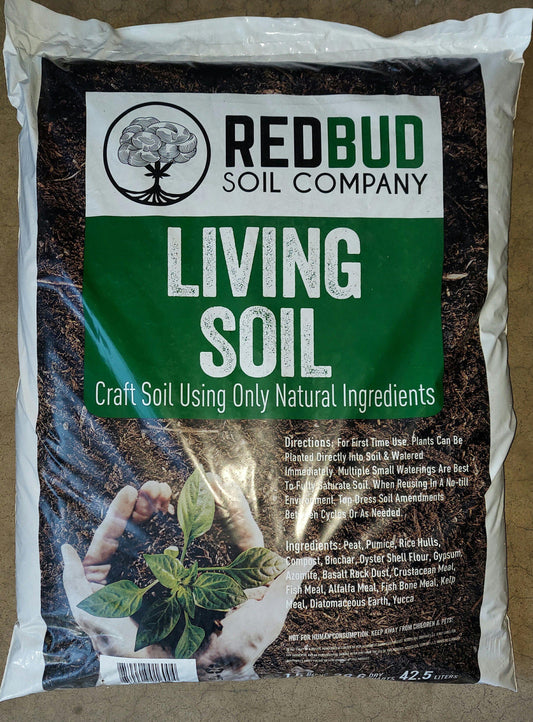Collection: Organic No-Till Living Soils™
Here at Redbud Soil Company we specialize in organic soil, including our NO-TILL LIVING SOIL™ small batch soil. Our premium soil blend is mixed in small batches, and hand crafted in our Oklahoma City location.
Questionable ingredients
Municipal compost is made from yard waste, and tree waste from cities and counties. The amount of chemicals sprayed on the average Americans lawn is nothing that you would want to include in your no-till garden. So why would composting this be OK to add to your soil? Composted poultry manure from non-organic farms will typically contain high levels of arsenic. Arsenic is added to the poultry feed to kill rats and mice, and this arsenic transfers into their waste and is then composted down.
Questionable soil amendments use to be the norm. Blood meal and bone meal were the standard for the old “super soil” days. This was long before anyone asked what the farm animals were fed, what hormones were injected into them, and what life long antibiotics they were on. Feather meal from non-organic sources has the same issue that poultry compost has. They both contain high levels of arsenic. Used in conjunction, poultry compost and feather meal could make your plants end up containing higher than allowable arsenic levels which will then transfer into the finished product.
Bat guano was a long time staple in the cannabis industry. It comes in many different NPK values, and can be used at pretty much any stage of growth. The major downside of it is that when it is harvested the bats habitat is destroyed. From a nutrient stand point bat guano isn't as good as many of the other readily available non-habitat destroying soil amendments. The powdered form of guano only provides available nutrients for 3 to 4 weeks. This gives guano a limited lifetime, all while destroying a sensitive part of our ecosystem.
As the soil market has expanded into no-till as being the dominate driving force for the way things should be done, these same Companies are now marketing their soils for no-till applications. When in all actuality they were never designed, or tested to be specifically used in a no-till environment.
Our founder has spent the last 8 years testing, and designing our current no-till living soil blend. Through side by sides, field trials, and soil tests, our current blend has been engineered to give optimum performance in a no-till environment.
Premium ingredients
Our soil blend is not called premium as part of a sales pitch. Our ingredients have been exhaustively tested to provide optimum conditions for a no-till grow. From the compost we use, to all of the amendments in our blend, we work to ensure we are always creating the best start to your next no-till garden.
It starts with the compost
The compost we use in our soil is made in Oklahoma. The base is made from forest wood waste, and it is amended in the field with other additives to create a super premium compost product that ends up being extremely fungally dominate. Once mixed in our soil, fungal hyphae begin to develop within 24 hours. It is very normal for 1 yard totes to be covered in white hyphae all over the top layer of the soil.
Our mix is comprised of roughly 5% biochar. Since our soil is designed for no-till we use a super chunky biochar that will give aeration along with the standard properties that biochar brings to the table.
The base of our soil is comprised of peat, rice hulls, and perlite. We use rice hulls that are grown and packaged in Arkansas.
The list of soil amendments used in our soils are Oyster Shell Flour, Gypsum, Azomite, Basalt Rock Dust, Crab Shells, Fish Meal, Alfalfa Meal, Fish Bone Meal, Kelp Meal, & Diatomaceous Earth.
The entire basis of Redbud Soil is to put the power of organic practices into the hands of ANYONE who wants to use them. Our no-till living soil is a foundation in the pursuit of growing high terpene organic plants, with little to no water runoff, and limited inputs. All while focusing on the highest quality output possible.

-
1.5 Cubic Foot Bag Organic No-Till Living Soil
Regular price $26.99 USDRegular priceUnit price / per

